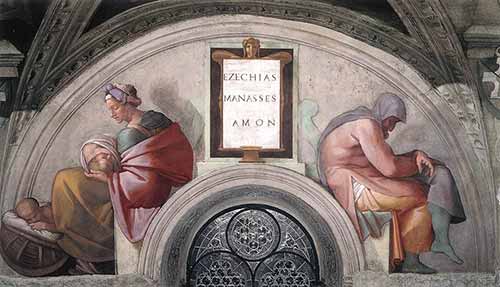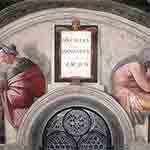
and Uzziah the father of Jotham, and Jotham the father of Ahaz, and Ahaz the father of Hezekiah, and Hezekiah the father of Manasseh, and Manasseh the father of Amos, and Amos the father of Josiah, and Josiah the father of Jechoniah and his brothers, at the time of the deportation to Babylon. (Matthew 1:9-11)
Ὀζίας δὲ ἐγέννησεν τὸν Ἰωαθάμ Ἰωαθὰμ δὲ ἐγέννησεν τὸν Ἀχάζ Ἀχὰζ δὲ ἐγέννησεν τὸν Ἑζεκίαν Ἑζεκίας δὲ ἐγέννησεν τὸν Μανασσῆ Μανασσῆς δὲ ἐγέννησεν τὸν Ἀμώς Ἀμὼς δὲ ἐγέννησεν τὸν Ἰωσίαν Ἰωσίας δὲ ἐγέννησεν τὸν Ἰεχονίαν καὶ τοὺς ἀδελφοὺς αὐτοῦ ἐπὶ τῆς μετοικεσίας Βαβυλῶνος
This is the seventh post in a series – you can begin here:
Matthew in Slow Motion 1
Matthew in Slow Motion 2
Matthew in Slow Motion 3
Matthew in Slow Motion 4
Matthew in Slow Motion 5
Matthew in Slow Motion 6
As this year the Sunday Gospel readings’ focus is on St Matthew’s Gospel, I thought I’d start some of my personal study and Lectio Divina with that Gospel. [NB. I am using ‘Matthew’ as a convenient term for the author of the first Gospel in the order of the Christian canon].
Amos – sorry people! Here we go again. Matthew is confused. It’s not actually “Amos”. Check 1 Chr 3:14; 2 Chr 33:20-25; 2 Kings 21:18-26 – it’s “Amon”. And I love the fact, once again, that readers of King James can just carry on as if Matthew (ie. the Bible) never makes a mistake:
and Manasses begat Amon; and Amon begat Josias; (Matthew 1:10 KJV)
Moral: if you are going to hold to the inerrancy/historicity of the Bible (or at least of Matthew) read KJV so that conviction is not questioned by the text…
Even our picture at the top of this post, from Michelangelo, has tidied up “Amos” to be “Amon”.
Josiah the father of Jechoniah and his brothers – actually, there is (again) the skipping of a generation. Josiah was the father of Jehoiakim. Jehoiakim was the father of Jechoniah. Some manuscripts, clearly uncomfortable about the skipping, add Jehoiakim into Matthew’s text. But that’s worse! Now Matthew’s numbering system that he’s so obsessed with (spoiler alert!) gets thrown out.
We’ve been asking: why start with Abraham? Why are the (these particular) women included? [OK, people, you know me well enough – we could be asking “why are the men included?” But that’s not difficult to answer!] Now we can ask: Why is the “deportation to Babylon” so significant? I think it is, again, because of Matthew’s focus on “King”. The Deportation to Babylon is the end of the Southern Kingdom. It begins a waiting for a new king…
To be continued…
If you appreciated this post, consider liking the liturgy facebook page, using the RSS feed, and/or signing up for a not-very-often email, …




Bosco, isn’t it likely that the name “Amos” found its way into Matthew’s source material or later versions of his text by accident. Aren’t you laying “blame” on Matthew for a scribe’s mishap?
No, Kevin. In this case textual criticism argues the opposite for your latter point. Amos is Matthew’s original, Amon is a later alteration of Matthew’s text. As to your conjecture that Matthew was working from a source which already had Amos in it – yes, one might conjecture that. I’m not sure to what end. As we do not have the source with this error you suggest, it remains at the level of pure conjecture. Blessings.
I’ll have to look at this more deeply. I vaguely remember one scholar suggesting that “Amos” was Matthew’s intention and that he wanted to make the tie to early prophecy. Are you familiar with this idea? (I wonder if the argument is strengthened by looking elsewhere in Matthew.)
Yes, Kevin. That point is generally discounted. It also confuses: Amos was not part of the genealogy as I’ve shown in my OT quotes – that was Amon. And you cannot have it both ways: Matthew wrote Amon and it was later changed by accident to Amos; Matthew used Amos on purpose, even though he knew that the prophet Amos was not in Jesus’ genealogy. Blessings.
I think all the signs are there, especially the 14 generations (7 x 2), that the list is meant to be symbolic. A core of OT genealogy which Matthew has modified to express the point Matthew wants to make. The Jewish tradition (eg midrash, translations into Aramaic Hebrew, Talmud) is much more comfortable with this than we are with our modern biases of scientific/factual/fundmentalist reading of scripture.
Many Blessings
I totally agree, Chris. There are some spoilers in your comment 😉 Blessings.